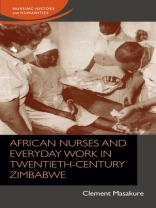Informed by the memories of African nurses, this book highlights the experiences of men and women who provided nursing services in Zimbabwe’s hospitals in the twentieth–century. It argues that in their subordinate positions, and within their various capacities – nursing assistants, nursing orderlies, medics and qualified nurses – African women and men played a pivotal role in the provision of healthcare services to their fellow Africans. They transformed hospital spaces into their own, reshaped and reformulated indigenous as well as western nursing and biomedical practices. Through their work, African nurses contributed to the development of the nation by being at the bedside, healing the sick and nursing the infirm.
Tabla de materias
1 Introduction: African nurses in Zimbabwe’s hospitals 2 The experiences of the pioneer generation of nurses,
c. 1900–49 3 ‘Our kitchen days are over … We can no longer continue the tradition of our predecessors’: Taking up nursing as a career option,
c. 1950 to the 1960s 4 The Africanisation of Rhodesia’s clinical spaces and an anatomy of everyday work in hospitals, 1960–70 5 Nursing a nation at war: Nurses’ experiences during the 1970s 6 The trajectories of nursing in independent Zimbabwe, 1980–96 7 Conclusion: Nurses and nursing in twentieth-century Zimbabwe
Appendix 1: Colonial and post-colonial names
Appendix 2: Explanations and translations
Bibliography
Index
Sobre el autor
Clement Masakure is a Senior Lecturer in the Department of History at the University of the Free State












